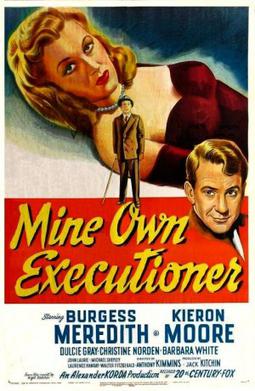Mine Own Executioner
Mine Own Executioner is a novel written by British author Nigel Balchin, published in 1945. The story delves into the complex world of psychological trauma and the early days of psychotherapy in England. It is considered a significant work in the literature of psychology and has been praised for its insightful exploration of the human mind and the ethical dilemmas faced by psychotherapists.
Plot Summary[edit | edit source]
The novel follows the story of Felix Milne, a lay psychotherapist in London, who is not formally trained as a doctor but has a keen interest in the workings of the human mind. Milne is presented with a challenging case: Adam Lucian, a former fighter pilot suffering from post-traumatic stress disorder (PTSD) after his experiences in World War II. As Milne delves deeper into Lucian's troubled psyche, he must navigate his own personal dilemmas and the ethical boundaries of his profession. The title, Mine Own Executioner, reflects the internal struggles of both the therapist and the patient, suggesting that individuals can often be their own worst enemies.
Themes[edit | edit source]
The novel explores several themes, including the nature of guilt, the responsibility of the therapist towards their patient, and the question of whether people can truly change. It also examines the impact of war on individuals, highlighting the long-term psychological effects of combat. Balchin's work is notable for its early and sensitive portrayal of PTSD, a condition that was not widely recognized or understood at the time.
Reception[edit | edit source]
Upon its release, Mine Own Executioner was acclaimed for its psychological depth and realism. Critics praised Balchin's ability to create complex, believable characters and his skillful handling of the novel's themes. The book is considered a precursor to later works that deal with similar subjects, and it has retained its relevance over the years, being studied for its contributions to literature on psychology and its historical context.
Adaptations[edit | edit source]
The novel was adapted into a film in 1947, directed by Anthony Kimmins and starring Burgess Meredith as Felix Milne. The film adaptation received positive reviews for its faithful representation of the book's themes and its strong performances.
Legacy[edit | edit source]
Mine Own Executioner remains an important work in the canon of British literature, particularly for its pioneering exploration of psychotherapy and mental health. Nigel Balchin's novel has influenced subsequent generations of writers and continues to be of interest to readers and scholars interested in psychology, literature, and the social history of the mid-20th century.
Search WikiMD
Ad.Tired of being Overweight? Try W8MD's physician weight loss program.
Semaglutide (Ozempic / Wegovy and Tirzepatide (Mounjaro / Zepbound) available.
Advertise on WikiMD
|
WikiMD's Wellness Encyclopedia |
| Let Food Be Thy Medicine Medicine Thy Food - Hippocrates |
Translate this page: - East Asian
中文,
日本,
한국어,
South Asian
हिन्दी,
தமிழ்,
తెలుగు,
Urdu,
ಕನ್ನಡ,
Southeast Asian
Indonesian,
Vietnamese,
Thai,
မြန်မာဘာသာ,
বাংলা
European
español,
Deutsch,
français,
Greek,
português do Brasil,
polski,
română,
русский,
Nederlands,
norsk,
svenska,
suomi,
Italian
Middle Eastern & African
عربى,
Turkish,
Persian,
Hebrew,
Afrikaans,
isiZulu,
Kiswahili,
Other
Bulgarian,
Hungarian,
Czech,
Swedish,
മലയാളം,
मराठी,
ਪੰਜਾਬੀ,
ગુજરાતી,
Portuguese,
Ukrainian
Medical Disclaimer: WikiMD is not a substitute for professional medical advice. The information on WikiMD is provided as an information resource only, may be incorrect, outdated or misleading, and is not to be used or relied on for any diagnostic or treatment purposes. Please consult your health care provider before making any healthcare decisions or for guidance about a specific medical condition. WikiMD expressly disclaims responsibility, and shall have no liability, for any damages, loss, injury, or liability whatsoever suffered as a result of your reliance on the information contained in this site. By visiting this site you agree to the foregoing terms and conditions, which may from time to time be changed or supplemented by WikiMD. If you do not agree to the foregoing terms and conditions, you should not enter or use this site. See full disclaimer.
Credits:Most images are courtesy of Wikimedia commons, and templates, categories Wikipedia, licensed under CC BY SA or similar.
Contributors: Prab R. Tumpati, MD

